- Home
- Sherry Thomas
The Magnolia Sword Page 26
The Magnolia Sword Read online
Page 26
He leans in and whispers in her ear, but to those of us whose hearing has been sharpened by years of training, he might as well have shouted his words from the rooftops. “If you wish the swords to be reunited, Mother, perhaps you can see your way to arranging a match between me and Miss Hua?”
Kai and I sit shoulder to shoulder as our small boat drifts lazily in a field of water lilies.
I never thought I would see Lake Tai again, yet here I am, surrounded by her clear, abundant water, breathing in the fragrance of high summer.
We have been on assignment in the South, a delicate yet dangerous mission which we have just concluded. And Kai has arranged for this small holiday near my old haunts before our return to the North.
“Thank you,” I murmur in his ear.
“I’ll do anything to make you happy,” he murmurs back. “You’re less terrifying when you’re happy.”
I laugh. I am happy. And I am happier yet to realize that while the South is as beautiful as I remembered, this time, when I leave, I will not miss it as much. That even as my heart sighs over the absolute loveliness of the lake turning gold and red in the light of sunset, I am looking forward to returning to the North, my new home.
And to all the challenges and rewards of my new life.
In June of 2017, my agent emailed me out of the blue and asked if I had any interest in doing a YA retelling of the ballad of Mulan. My first reaction was laughter, not in derision, but in sheer astonishment. On paper I seemed a good candidate for such an adaptation: I grew up in China; I’d made a career out of historical fiction; I’d even produced two books, set partly in China, featuring a young woman who is a highly skilled martial artist. But in reality I’d never had the slightest interest in the legend of Mulan.
But now I was intrigued.
The original ballad tells the very simple story of a girl leaving home in her father’s stead to go to war and then coming back. I could have taken it in any direction I wanted, and I chose to infuse it with elements of wuxia, a uniquely Chinese literary genre that explores themes of honor, sacrifice, vengeance, and forgiveness through the adventures of almost mythically adept martial artists. The editor who suggested the retelling, Cheryl Klein of Lee & Low Books, liked that approach, and we decided to go forward on the project.
And then I realized I knew next to nothing about China in the fifth century AD, when the story of Mulan is most commonly inferred to have taken place. I didn’t know what people ate—it turned out that many staples of my childhood diet, like potatoes, tomatoes, and peanuts, originated in the New World. I didn’t know what people read—most of what I considered ancient Chinese poetry dates from the Tang Dynasty and later, hundreds of years after Mulan’s day. I didn’t even know whether Confucius had been born by then. (He was, in fact, born about a thousand years earlier—which should tell you a lot about the depth of my ignorance.)
So I set out to learn about the time period. And what I learned challenged, even upended, many of my own notions of what it means to be Chinese.
Though I remembered little of the animated Disney version of the story, I did remember that the invaders were called the Huns. (Whether any of the nomadic tribes that clashed repeatedly with the Han Chinese were, in fact, the Huns is a matter of debate—there is no definitive evidence.) So while I was not surprised that in the fifth century, the dynasty that controlled the northern half of China had to contend with incursions from a nomadic confederation known as the Rouran, I was shocked to learn that this northern dynasty was itself nomadic in origin.
After the fall of the Han Dynasty in 220 AD, and until it was unified again under the Sui Dynasty in 581 AD (approximately a hundred years after the setting of this book), China was in a state of almost constant reconfiguration. The Three Kingdoms, the Six Dynasties, Sixteen Kingdoms, Northern and Southern Dynasties—those are just some of the names used to describe various periods within this generally tumultuous era.
Northern Wei, the dynastic time and place where the ballad of Mulan is typically assumed to have occurred, was one of these Northern and Southern Dynasties. It was founded by the Tuoba clan of the Xianbei tribe, one of the nomadic peoples that had settled in northern China centuries earlier.
In discovering this, I realized the north of China—and the south, too, with its indigenous peoples—was far more diverse than I’d supposed.
The debate concerning Sinicization you read in this book was also real. What is Sinicization? Think of it as the Chinese counterpart of Americanization, where peoples from many backgrounds converge into a single national identity. For example, the policy of giving Xianbei families Han Chinese names was later actually implemented. This meant that what I always took to be a rather monolithic Chinese identity was actually forged of the collision and melding of many cultures and many peoples.
Through writing this book, I learned that in its day, China had been quite the melting pot. (The founder of the Tang Dynasty, often considered the pinnacle of Chinese civilization, was himself half-Xianbei.)
That the age-old story of Mulan can actually be a timely exploration of whose voices are heard and whose stories get told.
That a girl who goes to war and finds her courage can at the same time unlearn ingrained biases and unpack her own assumptions.
All of which have made writing The Magnolia Sword one of the most rewarding experiences of my career, and for that I could not be happier.
Xiong means elder brother in Chinese, di, younger brother. Xiong-di, as a term, can refer to brothers in general, or it can be how one addresses a man younger than oneself. Di by itself would have been a more intimate address. Had Kedan not revealed to Tuxi that Mulan is a woman, at some point Tuxi would start addressing her as Mulan di, to indicate the depth and significance of their friendship. That’s also why he addresses Kai, once his own position is known, as Kai di.
Jiejie means elder sister. Mulan would call Murong didi. Gu-niang is a generic respectful address for a young woman.
While words for members of a family are always gender-specific—and often convey relative seniority between parties—Chinese as a whole is less gendered than many other languages. Gendered third-person pronouns did not come into use until the twentieth century, and the language makes no grammatical changes in response to gender. So it would not be terribly difficult to speak of someone without revealing their gender and without lying about it.
The Huns—a nomadic people of Central Asia—have entered the Western cultural imagination as barbarian invaders, thanks in part to their attacks on the Roman Empire a few decades before the start of this book. There have been scholarly arguments but no definitive evidence that the Xiongnu and the Huns are one and the same, or that they even belonged to the same loose confederation of nomadic tribes. I elected to refer to the Xiongnu once as “the Huns” so that readers will have a better understanding of what, culturally, the Xiongnu symbolized to the Han Chinese.
At the time of the setting of this book, the Chinese divided a day into twelve shi, each approximately the equivalent of two modern hours. I didn’t want to introduce yet another concept here, so occasionally I did use “hours” to express lengths of time.
During my research, I kept coming across references to wine in the time period, which puzzled me. Grape wine was available, yes, but I was pretty sure I was reading about alcoholic beverages made from grain. Weren’t all such beverages hard liquor? And then I learned that distillation, as a common practice, didn’t start in China—or elsewhere in the world—until centuries later. So the grain wines the Chinese drank then were probably around 10 percent alcohol by volume, stronger than beer but less potent than your average modern-day wine.
There are no definitive dates on when chairs began to be used in China. There were stools earlier, introduced by the nomadic tribes, but the general consensus is that proper chairs probably did not come into use until the Tang Dynasty, several hundred years after the setting of this book, and probably did not entirely replace sitting on mats
at or around low tables until the Song Dynasty. Until then, in formal settings, Chinese people sat on their knees and shins, with the buttocks on the feet.
At the border garrison, Tuxi, Mulan, Kedan, and Captain Helou play Chinese chess, or xiangqi, which dates back to the Warring States period (453-221 BC). Like Western chess, the game represents a war between two opposing armies. During the Tang dynasty, the playing pieces were renamed, so it’s possible that the piece nowadays referred to as the chariot was known as something else in Mulan’s day. But chariot sounds cooler, so chariot it is in this book.
The legendary swords Sky Blade and Heart Sea are based on an archaeological artifact known as the Sword of Goujian, unearthed in 1965 in Hubei Province, China. The Sword of Goujian is estimated to have been made during the Spring and Autumn period (771 to 403 BC). And when it was discovered, nearly two and a half millennia later, it had not rusted and still held a sharp edge.
Kristin Nelson, for herding this opportunity directly into my lap.
Cheryl Klein, for the sheer amount of work she put into this book. I didn’t even know editors edited like this anymore. Her dedication, energy, and vision guided me to produce a work that I am enormously proud of. Although I am still embarrassed that she read my first drafts, even partials—I haven’t inflicted those on anyone in quite some time.
Christina Chung and Neil Swaab, for the beautiful cover.
Linda Yu, for pointing me in the right direction on research.
Chris Stewart, for generously sharing his knowledge and expertise.
Janine Ballard, for always making my books better.
Cheryl Etchison, for telling me how excited her daughter is for this book. I tend to exist in a cave, so it’s really helpful to be reminded from time to time that I’m not doing this solely to honor a contract.
My family, for always being there.
And you, dear reader, for everything.

_preview.jpg) Claiming the Duchess (Fitzhugh Trilogy Book 0.5)
Claiming the Duchess (Fitzhugh Trilogy Book 0.5)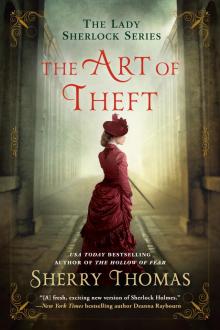 The Art of Theft
The Art of Theft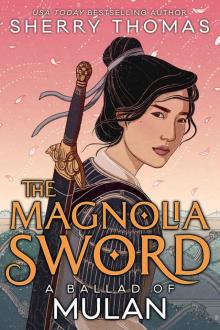 The Magnolia Sword: A Ballad of Mulan
The Magnolia Sword: A Ballad of Mulan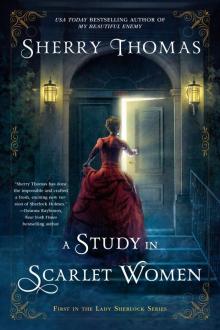 A Study In Scarlet Women
A Study In Scarlet Women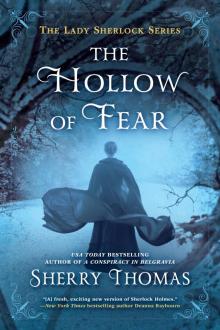 The Hollow of Fear
The Hollow of Fear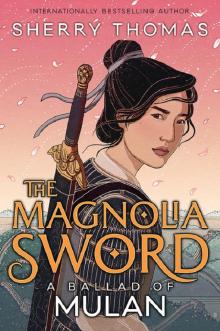 The Magnolia Sword
The Magnolia Sword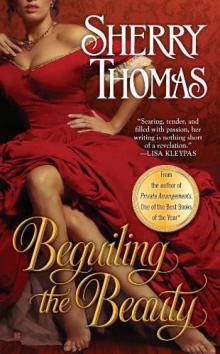 Beguiling the Beauty ft-1
Beguiling the Beauty ft-1 The Heart is a Universe
The Heart is a Universe The Hidden Blade: A Prequel to My Beautiful Enemy (Heart of Blade)
The Hidden Blade: A Prequel to My Beautiful Enemy (Heart of Blade) Ravishing the Heiress ft-2
Ravishing the Heiress ft-2 The Immortal Heights
The Immortal Heights The Hidden Blade
The Hidden Blade Ravishing the Heiress
Ravishing the Heiress Tempting the Bride
Tempting the Bride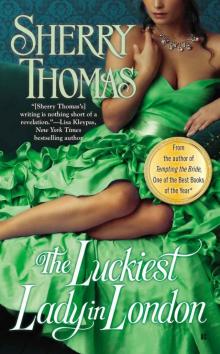 The Luckiest Lady in London
The Luckiest Lady in London The Bride of Larkspear: A Fitzhugh Trilogy Erotic Novella
The Bride of Larkspear: A Fitzhugh Trilogy Erotic Novella Claiming the Duchess
Claiming the Duchess The One in My Heart
The One in My Heart His At Night
His At Night A Dance in Moonlight
A Dance in Moonlight A Conspiracy in Belgravia
A Conspiracy in Belgravia Not Quite a Husband
Not Quite a Husband